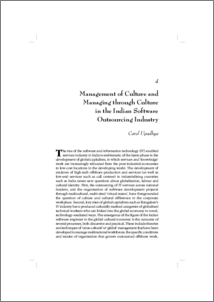Upadhya, Carol
(2008)
Management of Culture and Managing through Culture in the Indian Software Outsourcing Industry.
In:
In an Outpost of the Global Economy: Work and Workers in India's Information Technology Industry.
Routledge, London, pp. 101-135.
ISBN 978-0415456807
![[img]](http://eprints.nias.res.in/style/images/fileicons/application_pdf.png)  Preview |
|
PDF
C_Upadhya_Management_of_culture.pdf
- Published Version
Download (135kB)
|
| Abstract: |
The rise of the software and information technology (IT) enabled services industry in India is emblematic of the latest phase in the development of global capitalism, in which services and ‘knowledge’ work are increasingly relocated from the post-industrial economies to low-cost locations in the developing world. The development of
enclaves of high-tech offshore production and services (as well as low-end services such as call centres) in industrialising countries such as India raises new questions about globalisation, labour and cultural identity. First, the outsourcing of IT services across national borders, and the organisation of software development projects through multicultural, multi-sited ‘virtual teams’, have oregrounded
the question of culture and cultural difference in the corporate workplace. Second, key sites of global capitalism such as Bangalore’s IT industry have produced culturally marked categories of globalised technical workers who are linked into the global economy in novel, technology-mediated ways. The emergence of the figure of the Indian software engineer in the global cultural economy is the outcome of
several processes, both discursive and practical. These include theories and techniques of ‘cross-cultural’ or ‘global’ management that have been developed to manage multinational workforces; the specific conditions
and modes of organisation that govern outsourced offshore work, such as the ‘virtual team’; and the transnational work experiences of both Indian software engineers and their Western counterparts, which have produced standardised narratives about cultural difference that in turn structure interactions in the workplace and shape the subjectivities
of workers. |
| Item Type: |
Book Chapter
|
| Additional Information: |
Copyright of this article belongs to Routledge. |
| Subjects: |
School of Social Sciences > Sociology |
| Divisions: |
Schools > Social Sciences |
| Date Deposited: |
14 May 2008 12:22 |
| Last Modified: |
08 May 2015 09:36 |
| Official URL: |
|
| Related URLs: |
|
| Funders: |
UNSPECIFIED |
| Projects: |
UNSPECIFIED |
| DOI: |
|
| URI: |
http://eprints.nias.res.in/id/eprint/102 |
Actions (login required)
 |
View Item |


